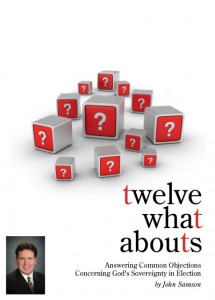HT: First Things
Category Archives: Books
Endorsements, Reviews and Interviews
 An author writes with the hope of being read, and more than that, not so much by my words, but by His word, His truth and His measureless grace as it is unfolded in the pages. May it be something of a tool in His hands for this purpose, for His glory.
An author writes with the hope of being read, and more than that, not so much by my words, but by His word, His truth and His measureless grace as it is unfolded in the pages. May it be something of a tool in His hands for this purpose, for His glory.
ENDORSEMENTS:
“It is a privilege to have received your book, ‘Twelve What Abouts.’ The title is great as are your ‘what abouts,’ and your responses. Thank you for your ministry in Christ’s kingdom and for the clear and thoughtful work that has gone into your book.” – Dr. R.C. Sproul, President, Ligonier Ministries
“Sometimes a single misapprehension or sticky question stands in the way of an honest believer’s examination of the doctrines of grace. John Samson answers those questions with a pastoral heart, yet with biblical fidelity.” – Dr. James White, Alpha and Omega Ministries
“After finishing a sermon from Ephesians 1, I was immediately confronted by three hostile young visitors who asked the question, ‘What about John 3:16?’; as if the Bible contradicted itself. This non-thinking, non-theological, feelings-oriented mindset is typical of today’s postmodern generation. Pastor Samson has given us a warm and simple (without being simplistic) introduction to the Doctrines of Grace, so this type of ignorance can be biblically combated. This book is a very helpful tool to give to a young Christian or to someone newly encountering the truths of free and sovereign grace. Distribute it widely.” – Rev. Earl M. Blackburn, Heritage Baptist Church, Shreveport, Louisiana
“I want to commend, to all readers seeking an honest look into these matters, this very fine treatment in which Pastor John Samson carefully answers the most common objections to the biblical doctrine of divine election. John is one of the most passionate Christians I know, whose number one purpose is to make Christ known. This work on the doctrine of election is no exception. In it you will find that the purpose of election is to bring all glory to Jesus Christ in our salvation.” – John Hendryx, from the Foreword
The book is available in eBook and paperback at the links on the right hand side of the page, as well as at amazon.com in eBook here and in paperback here and barnesandnoble.com.
The paperback edition is also available in the United Kingdom here for 10 pounds with free delivery (in the UK).
TABLE OF CONTENTS (168 pages)
Foreword by John Hendryx
A Word to the Reader
Chapter One: The Place to Start – Amazed by Common Grace
Chapter Two: The Wind Blows Where it Wishes
Chapter Three: A Surprising Journey
Chapter Four: What About the Love of God? (Part One)
Chapter Five: What About the Love of God? (Part Two)
Chapter Six: What About Free Will?
Chapter Seven: What About God’s Foreknowledge?
Chapter Eight: What About John 3:16?
Chapter Nine: What About 2 Peter 3:9?
Chapter Ten: What About 1 Timothy 2:4?
Chapter Eleven: What About Matthew 23:37
Chapter Twelve: What About 1 Timothy 4:10?
Chapter Thirteen: What About John 12:32?
Chapter Fourteen: What About Reprobation?
Chapter Fifteen: What About Lost Loved Ones?
Chapter Sixteen: What About Prayer and Evangelism?
Chapter Seventeen: Saving Faith
Chapter Eighteen: The Flaming Missiles of the Devil
Chapter Nineteen: Spiritual Dyslexia
Chapter Twenty: As the King’s Herald
Further Recommended Resources
BOOK REVIEWS:
INTERVIEWS:
Radio Interview: Backpack Radio interview, April, 2012
Video: Dr. James White’s Dividing Line interview, January 24, 2012
Spiritual Dyslexia
 Chapter 19 of my new book “Twelve What Abouts…”
Chapter 19 of my new book “Twelve What Abouts…”
Dyslexia warps reality; the consequences of which can be catastrophic. It is something that causes great hardship to multitudes in our day. People with normal, or even above normal, intelligence suffer from dyslexia as the brain reverses numbers, letters or words. It is a huge learning handicap and, in severe cases, can greatly limit education and employment opportunities.
For those unfamiliar with the problem, imagine having the word “GOD” written clearly in front of you and yet your brain interprets the information as “DOG,” as the first and last letters of the word are transposed. I am sure you will agree that there is a vast chasm of difference inherent in this misinterpretation. My heart truly goes out to those who have to go through life having to combat dyslexia.
Moving from the physical to the spiritual realm, I believe multitudes of Christians suffer from what I would call “spiritual dyslexia.” It’s a phrase I heard some years ago and found it to be a striking one. Theologians don’t use this language of course. They would be much more comfortable describing this concept as “the noetic effects of sin,” which is the simple recognition that since the Fall of Adam, all of mankind’s faculties have been negatively affected, including his mind. In simple terms, we just don’t think now as clearly and precisely as we would have done if there had been no Fall.
According to 1 Corinthians 13, this side of glory, we only see through a glass darkly. One day, we will all comprehend things exactly (as much as finite minds can grasp the infinite). Yet right now, we all have our traditions and blind spots. If we knew exactly where we were wrong, we would change our viewpoint immediately. But the point is that we do not see these things until God the Holy Spirit enlightens us and overcomes the effects of our depravity.
Someone suffering with spiritual dyslexia then reads certain Bible verses and, though the words are clear, the traditions of men jumble up the words or miss key words entirely in a sentence. Or they just do not grasp the meaning at all. I speak here from my own experience, as I can honestly say that I had read certain verses a certain way (giving them what I believed to be a true interpretation) for many years until, suddenly, God the Holy Spirit allowed me to overcome my deeply ingrained spiritual dyslexia to see what the Scripture actually said. This is especially true in my own theological journey towards Reformed theology. I say this (hopefully) not out of spiritual pride, but simply out of sincere grateful thanks to God for opening up my understanding to the true nature of His grace. Please allow me to cite just a few examples of what I am referring to with a few quotes from the Gospel of John.
Continue reading

